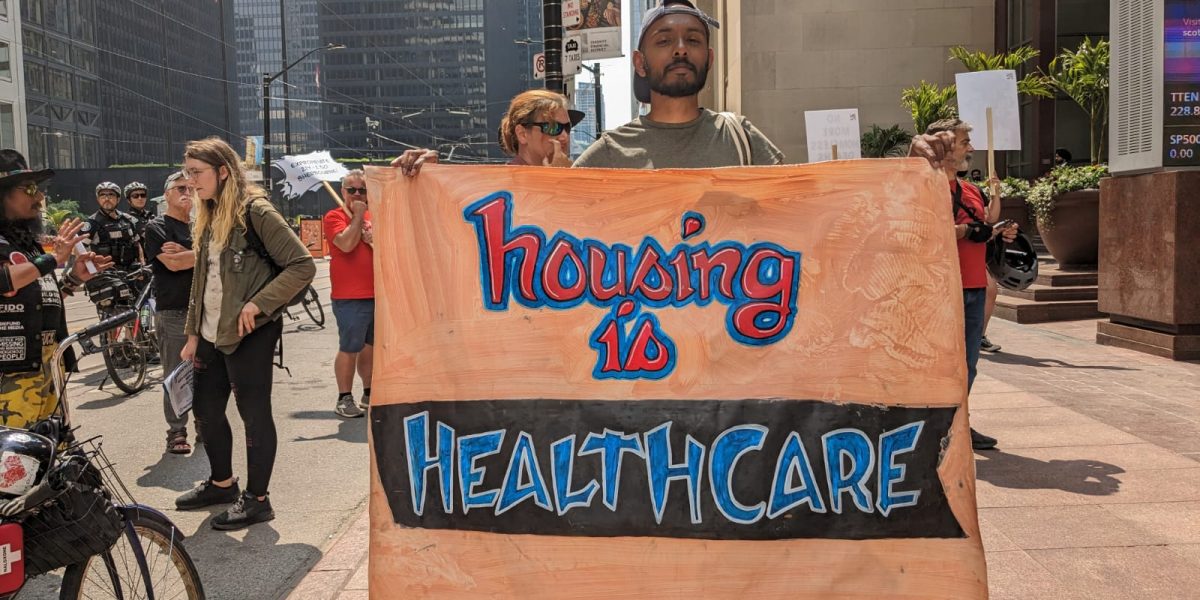230 Sherbourne Street has been a place of struggle for over a decade. Workers, advocates, and the community have been engaged in the struggle to turn the vacant lots and historical houses of 214-230 Sherbourne into social housing. Historically a working-class neighbourhood, Regent Park is currently undergoing the gradual gentrification of the area.
For years the community has been demanding that the City of Toronto expropriate 214-230 Sherbourne for geared-to-income housing units, especially as Dundas and Sherbourne has been an epicenter for poor and homeless Torontonians. Unfortunately, Kingsett Capital, one of Canada’s largest investment firms, outbid the city for the land and is now planning to build a 47-story, luxury condo building smack on the corner of Dundas and Sherbourne. 230 Fight Back, a community campaign, is organizing to challenge these developers. On June 10, 230 Fight Back organized a rally and march against Kingsett Capital to demand the city take action.
Housing not profits
The rally started with speeches from housing advocates, community workers, and Allen Gardens encampment residents. The passion from these speeches was palpable. Tears were shed as many spoke about the trauma of being homeless and being endlessly harassed by the city workers and the police. Lorraine Lam, a Community Outreach Worker, recalled a community member who 10 years ago was housed and “standing upright,” and now, due to years of sleeping in stairwells and at places like Mcdonalds, “walks with a hunchback.”
The speakers reminded us of the many lives lost to homelessness, street violence, and to the opioid crisis. From my own experiences, it would take me some time to recall the number of community members I’ve personally known and worked with who have died from the violence and neglect of the city to support the under-housed and address the opioid crisis. To say that people are fed up is an understatement; we are angry.
Continuing with a march to the headquarters of Kingsett Capital, the group chanted their demands for socialized housing. After spending some time at the Kingsett head office, the march continued to the Royal York Hotel, where Kingsett Capital owns 60 percent of the hotel. This is the same hotel that housed people during the pandemic, and then kicked them out after an alleged fire with no housing plan. Kingsett Capital and other corporations continue to put profit before people and many city officials continue to accept donations from these corporations instead of combating homelessness.
Need for social housing
The need for social housing is clear; the shelter system serves approximately 8600 people a night, with many more unhoused and sleeping on the street. City data shows that over 200 people experiencing homelessness died in 2021. This number is shameful; and tragically, these deaths could have been prevented.
In the past year, the city has closed down prominent shelter hotel programs, such as Novotel, against public health advice and without actual long-term housing plans for the residents. Many people were violently forced back onto the street after two years of being housed. The city plans to shut down two more hotel programs in August, again, without actual plans for long-term housing.
There is a real homelessness crisis in Toronto, and there isn’t any housing available for people. Instead of making the development of social housing a priority, the City of Toronto continues to let corporations buy out land and build luxury condos in areas such as Dundas and Sherbourne; this will push current residences out of the neighborhood and continue to gentrify Regent Park.
In addition, many studies have shown that homelessness costs the city more than implementing affordable and social housing. In 2021, it cost the city approximately $40 000 per person, per shelter bed, while the cost of permanent housing is about half of this. This number doesn’t cover the cost of additional healthcare or other emergency services, as homelessness negatively impacts people’s physical and mental health, which in turn requires more medical care. Strictly from an economic point of view, supporting people through social housing saves money.
Toronto’s housing crisis
All over the city there is a real housing crisis. Rent for a one-bedroom in Toronto is over $2500 a month. According to a recent report, Toronto had the highest increases in rental prices at 15.5 percent year over year, an average rent of $2808. It is no wonder that homelessness is on the rise. Greedy landlords continue to raise rent prices and engage in sketchy behaviour such as “renovictions” and other legal loopholes to push tenants out and often onto the street.
During the speeches given at the rally, Gaetan Heroux reminded us that the solution to the housing crisis cannot be in the hands of developers and mega-corporations whose only aim is to increase profits. They know that the housing crisis is profitable and therefore have no incentive to combat it. It isn’t just Kingsett, but all corporations that profit from this crisis. We were also reminded that this past November, developers tried to challenge the City’s policy of “affordable housing” from an income-based model of 30 percent of income towards housing costs, to a market-based model. Clearly, affordable housing is not their priority.
We, the poor and working class, are being priced out of living in Toronto. Practically, low-income, socialized housing must be prioritized to get folks off the street. But it doesn’t end there. There need to be real actions taken by the city to prevent homelessness. Rent caps are a start. Housing needs to be socialized; housing is a human right that corporations should not be able to hoard. Capitalism has created the grounds to commodify a basic human need, which we must challenge. People deserve dignity. People do not deserve to die on the street from preventable deaths. Housing is healthcare, housing is mental health care, and housing is dignity.
For more information about efforts and how to get involved, check out 230fightback.com. The next action will take place on June 14 at the AGM of the Toronto Board of Trade where Jon Love, the CEO of Kingsett Capital will be speaking.
Did you like this article? Help us produce more like it by donating $1, $2, or $5. Donate


